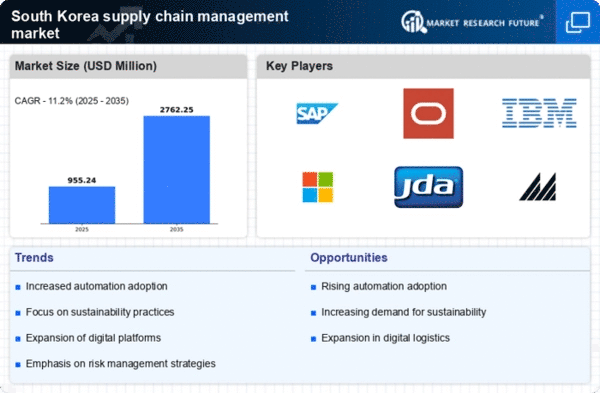Focus on Cost Efficiency
Cost efficiency remains a critical driver in the supply chain-management market in South Korea. Companies are increasingly seeking ways to optimize their supply chains to reduce operational costs. Strategies such as lean inventory management and just-in-time delivery are being implemented to minimize waste and enhance profitability. It is estimated that organizations that adopt these practices can achieve cost reductions of up to 15%. This focus on cost efficiency not only improves the bottom line but also allows businesses to remain competitive in a rapidly evolving market, thereby influencing the dynamics of the supply chain-management market.
Regulatory Compliance and Standards
Regulatory compliance is a significant driver impacting the supply chain-management market in South Korea. The government has established various regulations aimed at ensuring safety, quality, and environmental sustainability within supply chains. Companies are required to adhere to these standards, which can influence operational practices and costs. For example, compliance with environmental regulations may necessitate investments in greener technologies and processes. As businesses navigate these regulatory landscapes, the ability to maintain compliance while optimizing supply chain operations is becoming increasingly crucial, thereby shaping the future of the supply chain-management market.
E-commerce Growth and Consumer Demand
The surge in e-commerce activities is significantly influencing the supply chain-management market in South Korea. As online shopping continues to gain traction, businesses are compelled to adapt their supply chains to meet the increasing consumer demand for faster delivery times. Reports indicate that e-commerce sales in South Korea are projected to reach approximately $100 billion by 2025, necessitating more efficient logistics and distribution networks. This shift is driving companies to invest in advanced supply chain solutions that can handle the complexities of e-commerce, thereby reshaping the landscape of the supply chain-management market.
Technological Advancements in Logistics
The supply chain-management market in South Korea is experiencing a notable shift due to rapid technological advancements in logistics. Innovations such as automation, artificial intelligence, and the Internet of Things (IoT) are enhancing operational efficiency. For instance, the integration of AI in inventory management has been shown to reduce costs by up to 20%. Furthermore, the adoption of automated warehousing solutions is expected to increase productivity by 30% over the next few years. These advancements not only streamline processes but also improve accuracy in demand forecasting, which is crucial for maintaining competitive advantage in the supply chain-management market.
Rising Demand for Transparency and Traceability
In the supply chain-management market, there is a growing demand for transparency and traceability among consumers and businesses alike. Stakeholders are increasingly concerned about the origins of products and the ethical practices involved in their production. This trend is prompting companies to invest in technologies that enhance visibility across the supply chain. Blockchain technology, for instance, is being explored as a means to provide secure and transparent tracking of goods. As consumers become more discerning, the ability to demonstrate ethical sourcing and production practices is likely to become a key differentiator in the supply chain-management market.
















